Aug . 10, 2024 00:55 Back to list
Leading Manufacturers of Hydraulic Cylinder Tubes for Industrial Applications and Custom Solutions
The Importance of Choosing the Right Hydraulic Cylinder Tube Manufacturers
Hydraulic systems play a vital role in various industrial applications, from construction machinery to automotive equipment. At the heart of these hydraulic systems lies the hydraulic cylinder, comprising various components including the hydraulic cylinder tube. Selecting a reliable hydraulic cylinder tube manufacturer is crucial for ensuring the performance and longevity of hydraulic systems. This article explores the importance of choosing the right manufacturers for hydraulic cylinder tubes and the factors to consider during the selection process.
Understanding Hydraulic Cylinder Tubes
Hydraulic cylinder tubes are critical components that house the piston, allowing pressurized hydraulic fluid to generate movement. The quality and characteristics of these tubes directly influence the efficiency, safety, and durability of hydraulic machines. Poorly manufactured tubes can lead to leaks, failures, and even catastrophic accidents, which can result in significant financial losses and jeopardized safety.
Key Factors to Consider When Choosing Manufacturers
1. Quality and Standards The first criterion to consider is the manufacturer's adherence to quality standards. Manufacturers should comply with industry-specific standards such as ISO 9001, ensuring that their products meet rigorous quality requirements. High-quality raw materials and precision manufacturing processes are essential for producing reliable hydraulic cylinder tubes.
2. Material Selection The type of materials used in the manufacturing of hydraulic cylinder tubes significantly affects their performance. Common materials include carbon steel, stainless steel, and aluminum, each offering different benefits such as strength, corrosion resistance, and weight. A reputable manufacturer should provide a range of material options suited to various applications and environmental conditions.
hydraulic cylinder tube manufacturers

3. Customization and Flexibility Every industrial application is unique, and sometimes off-the-shelf solutions may not suffice. The right manufacturer should offer customization options to cater to specific needs, such as varying dimensions, wall thicknesses, and finishes. This flexibility is essential for optimizing hydraulic performance.
4. Manufacturing Capabilities The manufacturing process, including techniques like honing, grinding, and surface treatment, directly impacts the final product's quality. Companies with advanced manufacturing capabilities such as CNC machining and automated processes tend to produce more consistent and precise tubes. A manufacturer’s ability to invest in modern technology is a good indicator of their commitment to quality.
5. Experience and Reputation Experience in the field often translates to expertise and reliability. Manufacturers with a long-standing reputation in the industry have likely established robust quality controls and customer service protocols. Reviews and testimonials from previous clients can provide insight into a manufacturer’s reliability and performance.
6. Customer Support and Service Excellent customer support is essential for addressing issues that may arise during the procurement and installation of hydraulic cylinder tubes. A good manufacturer should offer responsive communication, technical support, and guidance throughout the product lifecycle.
7. Sustainability Practices In today's environmentally conscious climate, considering a manufacturer’s commitment to sustainability can also be important. Companies that incorporate eco-friendly practices in their operations not only contribute positively to the environment but often achieve operational efficiencies that benefit their customers.
Conclusion
Selecting the right hydraulic cylinder tube manufacturer is a critical decision that can significantly impact the performance and safety of hydraulic systems. By considering factors such as quality, material selection, customization options, manufacturing capabilities, experience, customer support, and sustainability practices, companies can ensure they partner with a manufacturer that aligns with their needs and standards. Investing time in this selection process ultimately contributes to the efficiency and longevity of hydraulic machines, resulting in enhanced productivity and reduced operational risks.
-
1.5 Ton Flipping Oil Cylinder 70/82-40-217-720-Hebei Shenghan Hydraulic Machinery|Precision Hydraulic Cylinder,Custom Hydraulic Solutions
NewsAug.29,2025
-
1.5 Ton Flipping Oil Cylinder 70/82-40-217-720 | Hebei Shenghan Hydraulic Machinery Co., Ltd.
NewsAug.29,2025
-
High-Precision [90/105-50-180-480] Industrial Component | Durable & Reliable
NewsAug.27,2025
-
High-Performance Set of 50/60-45-290 471 | Durable & Reliable Components
NewsAug.26,2025
-
Efficient Pallet Truck Power Units - Reliable Hydraulic Systems
NewsAug.25,2025
-
Premium Set of 50/60-45-290 471 Parts | High Performance
NewsAug.24,2025
